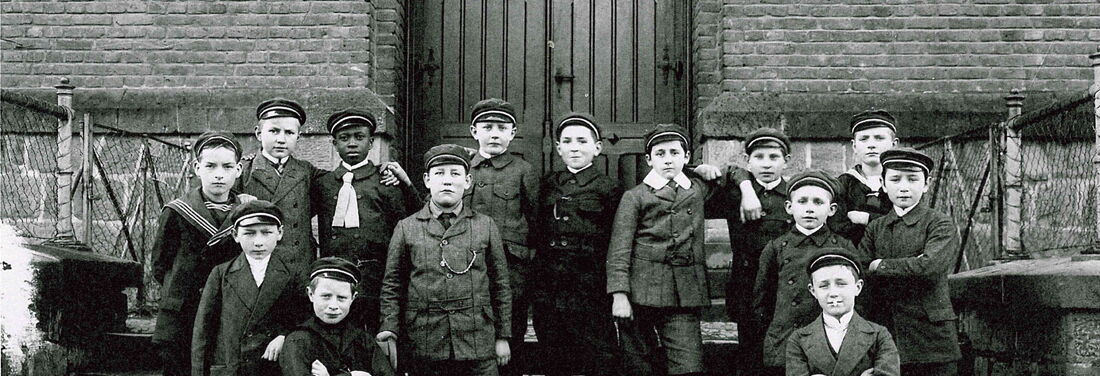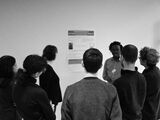Dualla Misipo: “Der Junge aus Duala”. Literaturwissenschaftliche Perspektiven auf ein frühes Werk der Schwarzen deutschen Literatur
Dualla Misipo’s Der Junge aus Duala. Ein Regierungsschüler erzählt ... [The Boy from Douala. A Government School Student Tells his Story …] is considered the “first novel by a Black German” and one of the earliest postcolonial literary texts in the German language. The novel, written between the 1920s and 1960s, has occasionally been praised for its analysis of European racism and the psyche of the colonized subject and has received attention for its sophisticated aesthetic strategies. However, the book by the Cameroonian German French author has mostly gone unnoticed within German-language literature and literary studies. Therefore, a more intensive engagement with the text is long overdue—especially when it comes to meeting the demand for literary scholars to render visible the long-standing diverse and polyphonic Black literary tradition in Germany (Otoo/Oholi 2022).
The workshop aims to create a space to collaboratively contextualize Misipo’s Der Junge aus Duala and discuss it from a literary studies perspective. In addition to topics such as the German colonial rule in Cameroon, (post-)colonialism and migration as well as prejudices and forms of racism in the German Empire and the Weimar Republic, it is above all the author’s literary strategies that await closer examination. The workshop will thus focus on his play with different genres and stylistic registers, the complex, seemingly modernist treatment of temporality and the nuanced portrayal of subjectivity, the intertextual references to both Cameroonian and Afro-diasporic as well as European literary traditions, and the provocative reversal of colonial dichotomies such as center/periphery or nature/culture.
Fig. above: Klassenfoto Quarta 1914, Herborn, © Geschichtsverein Herborn e.V./Museum Herborn.
Program
Wednesday, 13 Nov 2024
6.30 pm
Opening event
- Susanne Gehrmann (HU Berlin): »Grand Prix de l’Afrique noire en 1963 ... mort en 1984 en Allemagne«. Eine Archivrecherche zu Jean-Ikelle Matiba
Thursday, 14 Nov 2024
2.30 pm
Opening
- Eva Geulen (ZfL): Greetings
- Sandra Folie, Gianna Zocco (ZfL): Introduction
15.00
Reading and talk
- Philipp Khabo Koepsell (Berlin): Reading from Der Junge aus Duala
followed by a talk with Robbie Aitken* (Sheffield Hallam University)
4.30 pm
- Ulfa von den Steinen (Berlin), Jürg Schneider* (Basel/Kinshasa): Über das Zustandekommen der beiden Ausgaben des Jungen aus Duala von 1973 (Kraus Reprint) und 2022 (Rüdiger Köppe Verlag)
- Sandra Folie, Gianna Zocco (ZfL): Auf der Suche nach dem Jungen aus Duala. Eine Archivrecherche
Friday, 15 Nov 2024
9.00 am
Der Junge aus Duala im Kontext von Misipos Schaffen
Chair: Dirk Naguschewski (ZfL)
- Andreas Schmid (FU Berlin): Ghana lag in Kamerun. Dualla Misipo, Leo Frobenius und die Neuerfindung des afrikanischen Mittelalters
- Sandra Folie, Gianna Zocco (ZfL): Dualla Misipos Beiträge in Zeitschriften und im Rundfunk (1930–1967)
10.00 am
Poster session: Postmoderne und postkoloniale Identitäten
The poster session will not be streamed via Zoom!
Chair: Jenaba Samura (ZfL)
- Burrhus Njanjo (University of Cologne): Identitätsfigurationen in Der Junge aus Duala und Ach, Kamerun! Unsere alte deutsche Kolonie von Kum’a Ndumbe III. Eine komparatistische Analyse
- Pascal Ongossi Assamba (Friedrich Schiller University Jena): Postmoderne und Postkolonialität im Jungen aus Duala
- Giresse Teikeu (Friedrich Schiller University Jena): Deutsches Kaiserreich und koloniale Migration: Selbstbehauptung und Interkulturalität im Jungen aus Duala
11.15 am
Intermediale Interventionen
Chair: Claudia Sackl (University of Zurich)
- Marlen Rieffel (HU Berlin): Die Soundscapes im Jungen aus Duala – Literarische Repräsentationen kolonialer Gewalt
- Sandra Folie (ZfL): Zwischen Illustration und Subversion: Zeichnungen im Jungen aus Duala
1.30 pm
Genrefragen und Intertextualität
Chair: Susanne Gehrmann (HU Berlin)
- Timothy Brown, Julia Rebholz* (University of Tübingen): Der Junge aus Duala als autosoziobiographisches Erzählen zwischen Deutschland und Kamerun
- El-Shaddai Deva* (University of Maroua, Cameroon): Dualla Misipo im intertextuellen Vergleich mit Ferdinand Oyono und Claire Goll
- Jeannette Oholi* (Dartmouth College, USA): Antirassismus in der Diaspora schreiben: Der Junge aus Duala und Chima Ojis Unter die Deutschen gefallen (poster)
- Mantahèwa Lebikassa* (Université de Lomé, Togo): Constant Kpao Sarès Tschinku im Gastland: Ein friedenstiftender ›Zwillingsroman‹ des Jungen aus Duala (poster)
3.30 pm
Identität, Alterität, Hybridität
Chair: Nadjib Sadikou (Europa-Universität Flensburg)
- Constant Kpao Sarè* (Université d’Abomey-Calavi, Benin): Auswandern mit afrikanischen Dingen im Kopf. Misipos Erfahrungen mit Dingen der Identität und Alterität im (post-)kolonialen Deutschland
- Abidemi Jimoh* (Stanford University, USA): Der Subalterne spricht Deutsch: Hybridity in Der Junge aus Duala
17.00
Panel discussion
Chair: Sandra Folie, Gianna Zocco (ZfL)
- Stil, Kanon, Erzählinstanz, Genre. Weitere germanistische und komparatistische Fragen an den Jungen aus Duala
with Albert Gouaffo (Université de Dschang, Cameroon), Andrea Hartmann (Goethe University Frankfurt) and Nadjib Sadikou (Europa-Universität Flensburg)
Participants marked with an asterisk* will join via Zoom.

